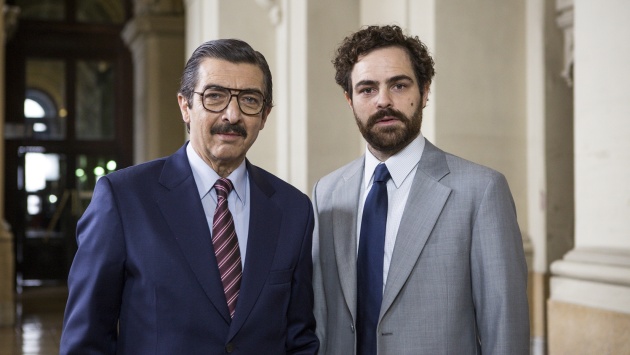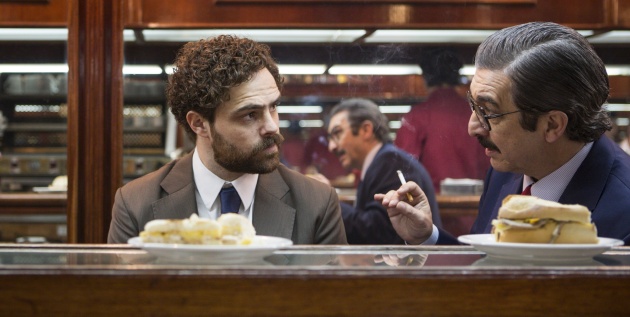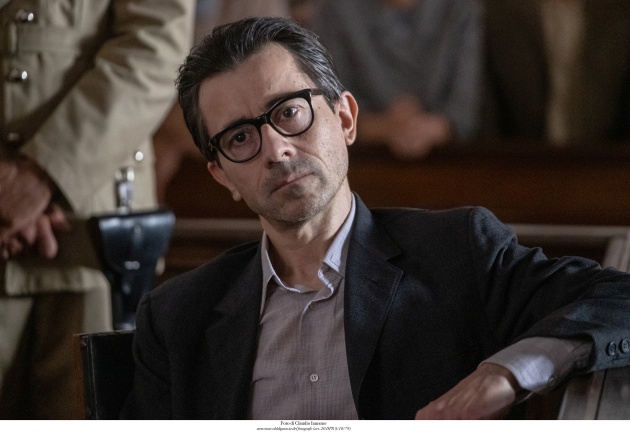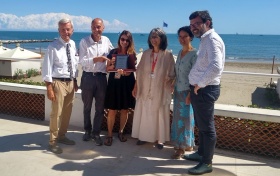More than heroes and villains

Argentina, 1985: Peter Lanzani und Ricardo Darín (© Amazon Studios -La Unión de los Rios - Kenya Films - Infinity Hill - ph. Lina Etchesun)
Argentina, 1985
Political films are not an easy genre. They run the risk of falling into clichés, dividing their characters into heroes and villains, and reducing complex political contexts to simple formulas. This year in Venice, there were a number of films which combined political themes with sophisticated storytelling and complex characters.
Outstanding in the competition was the Argentine feature "Argentina, 1985" by Santiago Mitre, which reconstructs in the form of a political thriller the first trial of those responsible for the Argentine military dictatorship (1976-1983). The charges were kidnapping, torture and murder of up to 30,000 dissidents and alleged "subversives." The outcome of the trial is well known, yet the film gains tremendous tension by focusing on lead prosecutor Julio Strassera and his investigative team. Strassera, played by Argentine star Ricardo Darín, initially believes he is being set up to find a scapegoat in case the trial does not take place. The elected government has not been in office for very long and the military is still dangerous. But the indictment actually goes ahead.

Together with his deputy Luis Moreno Ocampo (Peter Lanzani), Strassera assembles a team of young, inexperienced lawyers who travel the country collecting evidence and interviewing witnesses. The film vividly illustrates the incredible pressure the investigators are under; they have only five months, they are being obstructed and threatened. Strassera receives anonymous phone calls and death threats, yet he refuses to be intimidated. The main defendants, Jorge Videla and Emilio Massera, members of the military junta, are sentenced to lifelong imprisonment. For director Mitre, born in 1980, the film was also a personal journey into his country's traumatic past; for everyone else, it was a dramatic reminder of the courage it took to re-establish the rule of law in Argentina after the years of military dictatorship.
La Syndicaliste
Isabelle Huppert is the star of another political thriller, "La syndicaliste" (The Trade Unionist) by Jean-Paul Salomé, which was shown in the Orrizonti section. She plays trade unionist Maureen Kearney, who clashes with the powerful in the French nuclear industry and in politics. Representing the workforce, she fights against plans to break up the nuclear company Areva in favor of the semi-public electricity company EDF and strike a secret deal with the Chinese government. At stake is the preservation of 50,000 jobs in the French nuclear industry. Her attempts to alert the new government of Socialist President Francois Hollande are to no avail. On the contrary, she receives all kinds of anonymous calls and threats.

Then, on December 12, 2012, the shocking climax with which the film begins. Her cleaning lady finds her in the basement, tied to a chair and badly abused. A scenario like out of a horror movie. In the course of the investigation, doubts about her credibility emerge; the police no longer regard her as a victim, but as a crazed troublemaker who staged the attack herself. Isabelle Huppert portrays the contradictions and stubbornness of this woman in a grandiose way. "With a blond wig, glasses and big earrings, I felt like a twin of the real character," she comments on her transformation. "I wanted to keep the audience guessing for a while whether Maureen was really a victim or if she was making it all up." Here lies the strength of the film, that it does not simply retell this political and legal scandal, but asks the audience to make up their own minds. It is only thanks to her tenacity that justice is done to Maureen Kearney in the end.
Il Signore delle formiche
Gianni Amelio's film "Il Signore delle formiche" (The Lord of the Ants) also deals with a political scandal, yet it is anything but a thriller. Rather, it is an angry look at the homophobic climate in Italy in the 1960s. In 1968, the homosexual writer and avant-garde poet Aldo Braibanti (Luigi Lo Cascio), who is also an ant researcher, is put on trial, citing a 1930s fascist law. He is accused of having seduced his student and lover Ettore (Leonardo Maltese) and "subjecting him psychologically and physically to his will." Ettore is kidnapped by his family and treated with electric shocks in a psychiatric hospital to "cure" him of his gay tendencies.

The trial is a farce, but Braibanti finds little support among the Italian public. Only Ennio Scribani (Elio Germani), a reporter for the Communist Party newspaper "L'Unità," reports on the case with sympathy and understanding. This brings him into conflict with his party, which condemns homosexuality as a perversion, thus ironically in line with the Catholic Church.
Gianni Amelio, who won the Golden Lion in Venice 24 years ago, witnessed the trial as a young man. "I was able to put myself in Braibanti's shoes and was afraid that it would happen to me in a similar way. I, too, experienced an agonizing love story, but fortunately did not end up in prison." Braibanti was originally sentenced to nine years, but was released earlier due to the support of prominent intellectuals. Amelio resists the temptation to stylize Braibanti as a victim, instead portraying him as a contradictory, not always sympathetic character. "Il Signore delle formiche" is full of anger and melancholy, infused with a deep sense of sorrow for the devastated love between the poet and his student.

